‘Alexei Navalny’s story has the makings of an epic’
He survived an assassination attempt only to be thrown into prison. Yet, somehow, anti-Putin crusader Alexei Navalny manages to remain defiant.
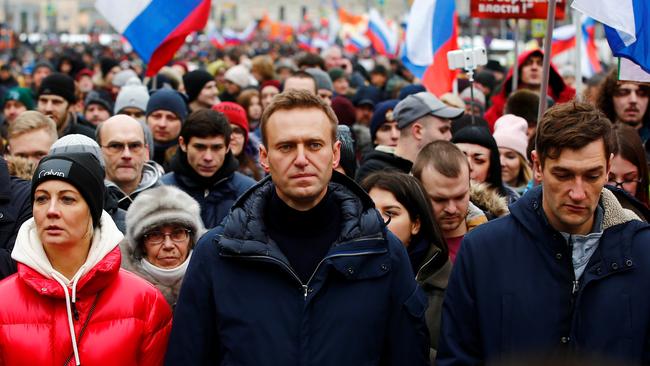
He’s been arrested so many times at protests that he’s lost count, been partially blinded after toxic chemicals were hurled in his face, almost died after being poisoned in Siberia, and was then sentenced to spend almost a decade in a Russian maximum security prison. Yet, somehow, Alexei Navalny keeps smiling.
A 45-year-old lawyer who rose from obscurity to become Vladimir Putin’s biggest domestic opponent, Navalny has been exposing Kremlin corruption since 2008. His campaign to dislodge Russia’s ruthless dictator has inspired unprecedented street protests; at their height these involved tens of thousands of people marching through Moscow chanting, “Putin is a thief.”
With his trademark mixture of wry humour and undisguised loathing of Putin’s regime, Navalny made political activism fashionable, convincing a generation of previously apathetic Russians that they had the power to bring about positive change. An early blog, its posts dotted with smiley faces, was called Final Battle Between Good and Neutrality. His slick video alleging that Putin, 69, is the secret owner of a vast and spectacularly gaudy palace on the Black Sea coast has been watched more than 123 million times on YouTube.
No wonder, his allies say, that the Kremlin hates him. No wonder, says Navalny, that Putin ordered his FSB security service to kill him with Novichok, the banned Soviet-era nerve agent, and then lock him up when he had the audacity not only to survive but to return to Russia. In February this year, as Russia geared up to launch its unprovoked invasion of Ukraine, Navalny went on trial on charges of embezzling 356 million roubles ($5.5 million) in donations to his Anti-Corruption Foundation (FBK). In essence, Moscow accused him of failing to spend the public’s money on investigating Putin and his notoriously crooked inner circle, a bizarre claim that highlighted the Kremlin’s willingness to twist reality to suit its own ends.
Navalny was tried inside the grim walls of Penal Colony No 2 near Moscow, the infamous prison camp where he has been incarcerated since February 2021, when he was sentenced to two and a half years on separate fraud charges. Western governments and human rights groups, as well as Navalny and his supporters, say all the charges against him are politically motivated and aimed at stifling his attempts to challenge Putin at the ballot box.
Access to the makeshift court was severely restricted, with members of the press confined to an adjacent room where they followed the trial on a television screen. Navalny’s wife was the only visitor, standing by his side as he harangued and mocked the judge, the government and Putin’s war in Ukraine. It was, his lawyer said, the first case in Russia of a criminal trial being held inside a prison camp.
Yet despite the Kremlin’s attempt to isolate Navalny, for many observers the most memorable images from the trial were of the gaunt opposition leader grinning and laughing with his wife and lawyer as if he didn’t have a care in the world. It was, by any standards, a remarkable display of defiance. “To get to the prison-camp court you have to go past endless checkpoints, barking dogs, armed guards, all that barbed wire. It’s all really gloomy and bleak,” says Ilya Yashin, a fellow opposition politician who was one of the last witnesses for the defence and has known the Kremlin critic for more than two decades. “But Navalny was incredibly upbeat. He was smiling, laughing. He was in great spirits. He was phenomenally optimistic, even in the absence of any grounds for optimism. I came away from the prison camp feeling inspired.”
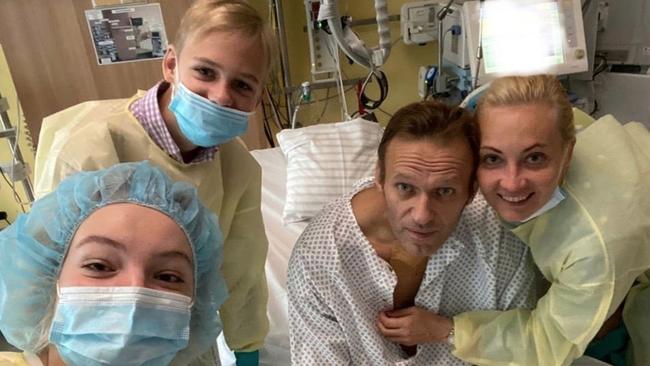
Navalny’s determination to remain positive in the face of the Kremlin’s merciless crackdown on dissent is one of his defining traits, says Lyubov Sobol, an anti-corruption lawyer who began working with him in 2011. “He is a very strong person. He doesn’t want to show Putin any weakness or indication that he is ready to give up in any way,” says Sobol, 34, speaking from an undisclosed location because of safety concerns. “Even though he knows that Putin will try to keep him in prison for as long as he can and that his sentence can be extended at any time.”
Like most of Navalny’s allies, Sobol was forced to flee Russia to avoid arrest after Moscow added the opposition leader, the FBK and his nationwide network of activists to its official list of “extremists” and “terrorists”, a designation usually reserved for Islamic fighters and neo-Nazi groups. In 2016, Sobol’s now ex-husband was attacked with a syringe containing an unknown chemical that left him briefly paralysed, while she has faced threats and round-the-clock surveillance.
“Navalny realises that he is being watched by the millions of Russians who support him and he tries to set an example with his strength of spirit, even in the tough conditions of a Russian prison,” she says. “He always said that the closer we get to the collapse of Putin’s regime, during its death throes, then the greater the Kremlin’s repression will be. He warned that there would be more attempts to eliminate us. But Navalny always knew the fight against Putin would be a marathon, not a sprint.”
So was Navalny prepared for Putin’s furious revenge? Sobol thinks before replying. “Inasmuch as anyone could be ready for an assassination attempt or to be imprisoned for an undetermined period. He has always been aware that some kind of… self-sacrifice would be necessary.”
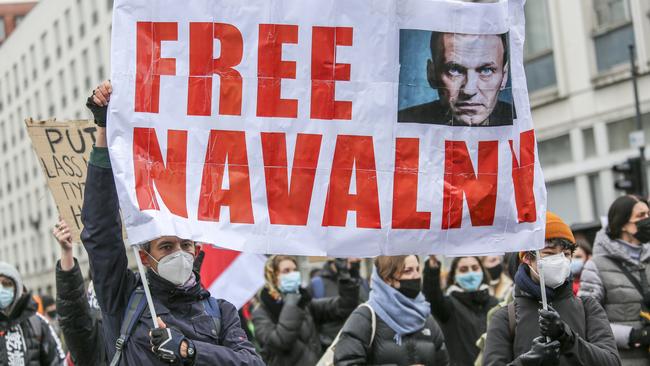
Navalny was born in 1976 into a military family near Moscow, but spent summers at his Ukrainian grandmother’s home near Chernobyl. A virulent anti-Communist, his grandmother once hopefully asked a relative if he had “spat” on Vladimir Lenin’s embalmed corpse after a visit to the Bolshevik revolutionary’s tomb in Red Square. Alexei studied law in the late ’90s at the same south Moscow university as Anna Chapman, the Russian intelligence agent deported from the US in a high-profile Cold War-type “spy swap” in 2010. Unsurprisingly, the two were not friends.
After graduation, Navalny worked for a while as a lawyer at a property firm, but his interest in opposition politics had already begun. In 2000, the year Putin won his first term of office, Navalny, then 23, joined Yabloko (“Apple”), Russia’s oldest liberal party. He would soon grow disillusioned, however, with what he saw as its unwillingness to seriously challenge Putin. “We were ambitious guys. We planned to change our country,” says Yashin. “It’s great that Navalny has managed to achieve such worldwide recognition. I never doubted that he had a big future ahead of him.”
Yulia Navalnaya, known as the opposition’s “first lady”, shuns the spotlight and has resisted calls to follow her husband into politics. The couple met at a Turkish holiday resort in 1998 and have an adult daughter, Daria, and a teenage son, Zakhar. The family’s flat has been repeatedly raided by police and Navalny almost lost the use of his right eye when a pro-Kremlin activist threw chemicals into his face in 2017. Their bank accounts have also been frozen. Yulia, also 45, insists that despite the family’s problems she has never tried to persuade her husband to give up his long and bitter fight to oust Putin. “He’s doing all this for us, for me and my children,” she once said. “I’ve never asked him to stop.”
In the mid-Noughties, Navalny flirted briefly with nationalism, attending the far-right Russian March in Moscow and recording two xenophobic videos, one of which likened illegal immigrants to tooth decay. The controversy has haunted him down the years and even led to Amnesty International briefly withdrawing its support for him. He finally apologised last year, telling Time magazine in a letter from prison that he regretted the “stupid” videos.
There appears to be little to link the nationalist-era Navalny with today’s model. His current allies are all liberal politicians and pro-democracy activists. Some of his younger supporters are even unaware of his nationalist past. “He has evolved greatly. He came to know Russia and Russians much better,” says Vladimir Milov, a former Russian deputy energy minister who is now one of Navalny’s closest allies. “He has evolved into a person who has a much broader vision about what our country needs.”
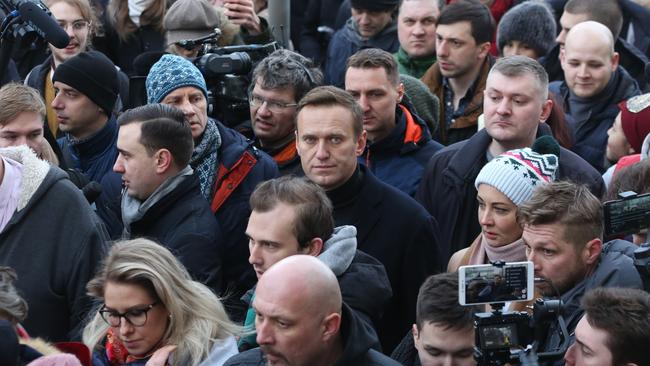
Navalny’s life over the past two years often seems to have been torn straight from the pages of a far-fetched Hollywood script. In August 2020, as he was flying home to Moscow from Siberia where he had lent his support to local activists, Navalny collapsed in agony. Fearful for his life, the plane’s pilots defied a hoax bomb warning to make an emergency landing. He was rushed to hospital in a critical condition.
Five days later, as Russian officials put forward a number of dubious explanations to account for his collapse, including overwork, too much alcohol or a “simple lack of breakfast”, Navalny was flown to Berlin for medical treatment. After tests, German doctors said he had been targeted with a form of Novichok, the same nerve agent that was used against Sergei Skripal, the former Russian agent, in Salisbury, England, in 2018.
After months of recuperation in Berlin, Navalny was back on his feet. And as soon as he was, he set about taking revenge. With help from Bellingcat, the investigative journalism website, he managed to call one of the FSB agents who had been tasked with killing him in Siberia. Posing as an aide to a senior Russian security official, Navalny demanded an urgent debriefing of the botched operation.
The conversation, which lasted around 25 minutes, was as surreal as it was shocking. Konstantin Kudryavtsev, the agent, revealed that the would-be assassins had broken into Navalny’s hotel room in Tomsk, a small Siberian city, and smeared Novichok onto his underpants while he was out. “Where on the pants?” Navalny asked. “The groin area,” came the reply. “What colour were the pants?” A brief pause as the unsuspecting FSB agent racked his memory. “They were blue.”
Despite the assassination bid, Navalny refused to put his personal safety above political considerations, saying that it would be “a gift” to Putin if he remained in exile. In January 2021, still suffering from the effects of his poisoning, Navalny and Yulia made a dramatic return to a snowy Moscow, flying in from Berlin on a flight packed with the world’s media. As thousands of his supporters gathered at an airport to meet him, the plane was diverted at the last moment above Moscow and he was arrested as soon as he reached customs. He kissed his wife goodbye. He has not been at liberty since.
Some opposition activists questioned his decision to return to Russia so soon. Several said he should have orchestrated resistance from abroad, like a modern-day Bolshevik revolutionary, while others claimed his arrival would have had more impact if he had timed it to coincide with last September’s parliamentary elections. Among his inner circle, however, Navalny’s determination to return as soon as possible had quickly become apparent.
“When he regained consciousness, I thought that it would be my duty to put in his mind the idea that he doesn’t have to return right away, that he can wait, that he has options. That he could manage our organisation from abroad, and so on,” says Vladimir Ashurkov, a former banker who is now the executive director of Navalny’s FBK anti-corruption group. “But when I started talking to him, I realised that it didn’t make sense to even speak to him about this.”
As speculation rises that Russia’s disastrous war in Ukraine could threaten Putin’s two-decade- long grip on power, the level of potential public support for Navalny is unclear. Just 2 per cent of Russians say they would vote for him, according to the Levada Center, an independent researcher. But his allies insist that if he were allowed to campaign freely, support would shoot up overnight. There is a precedent for this – at Moscow’s 2013 mayoral elections, the only time Navalny was allowed to run for public office, he took second place with almost 30 per cent of the vote, even though he was barred from national television. Unsurprisingly, the Kremlin has not allowed him to run for election since.
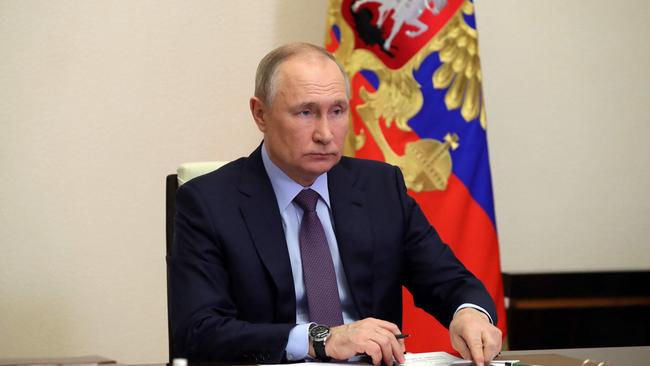
Despite Navalny’s emergence as Russia’s best-known opposition figure, Putin stubbornly refuses to say his name aloud, referring to him as “that gentleman”, “the person you mentioned” or, after his poisoning, “the Berlin patient”.
“For Putin, this is his own personal paranoia,” says Yashin. “There’s something semi-mystical here it seems. It’s almost like a ritual or a superstition – you spit over your shoulder three times, don’t cross the road if you see a black cat. If I don’t say Navalny’s name out loud then he isn’t so frightening.”
Navalny’s current prison camp, while strict, has allowed him regular access to his lawyers, who have passed on his defiant messages to the outside world, as well as conjugal visits by his wife. His new conviction and sentence mean he will be sent to a maximum security camp, possibly far from Moscow, where he will be kept in a cell rather than a barracks and allowed fewer visits. His supporters fear his isolation will put his life in even more danger. But, like Navalny, they have a resolute faith that history will eventually turn their way.
“The story of Navalny has the makings of an epic. It’s almost biblical,” says Ashurkov. “He’s a brave hero poisoned by his opponent, the tsar, and he miraculously survives assassination. He recuperates and he talks to one of his assassins. And then, despite all the threats, he returns to his home country where he is imprisoned but still sends his diatribes from behind bars and from his trial. This is a heroic story. And, you know, I don’t think we are at the end of it yet.”

To join the conversation, please log in. Don't have an account? Register
Join the conversation, you are commenting as Logout